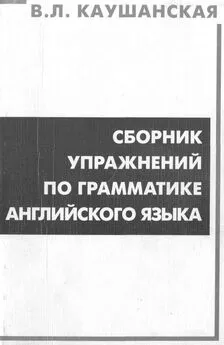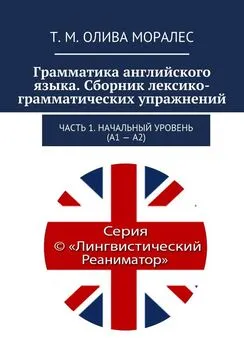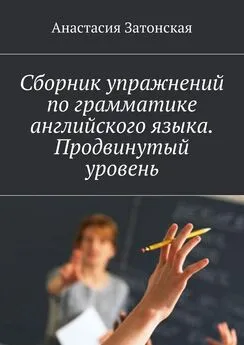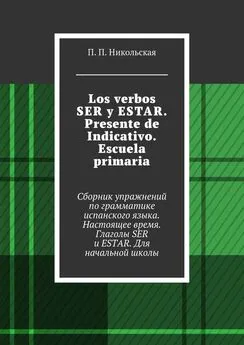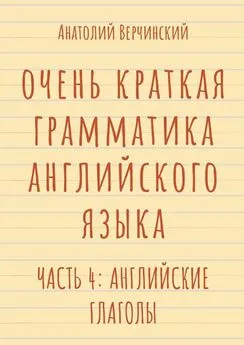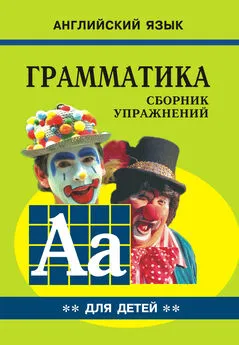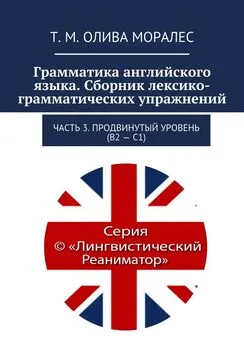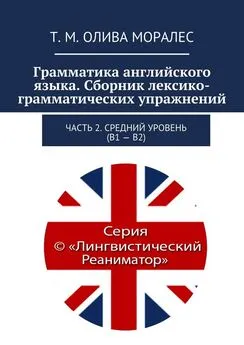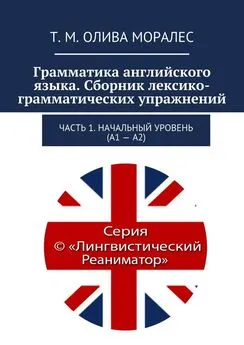В. Каушанская - Сборник упражнений по грамматике английского языка
- Название:Сборник упражнений по грамматике английского языка
- Автор:
- Жанр:
- Издательство:неизвестно
- Год:неизвестен
- ISBN:нет данных
- Рейтинг:
- Избранное:Добавить в избранное
-
Отзывы:
-
Ваша оценка:
В. Каушанская - Сборник упражнений по грамматике английского языка краткое содержание
Сборник упражнений по грамматике английского языка - читать онлайн бесплатно полную версию (весь текст целиком)
Интервал:
Закладка:
1. Когда уходит поезд в Киев? 2. Разногласия у них были только по одному пункту. 3. Больше ни одного слова не сказала она по дороге домой. 4. Он всегда был очень терпелив с детьми. Один только раз он рассердился на них. 5. Не успели мы войти в комнату, как начался дождь. 6. Когда я подошла к опушке леса, я увидела огромный зеленый луг. Никогда я не видела такого чудесного зрелища. 7. Как ни трудна была книга, мы читали ее с удовольствием. 8. Я так устала после экскурсии, что не могла идти в театр. Напрасно сестра пыталась уговорить меня, я не соглашалась. 9. Вот идет мой автобус. До свидания. 10. Такой интересный был спектакль, что мы жалели, когда он кончился. 11. Было бы у меня больше времени, я бы стала изучать итальянский язык. 12. Только когда она была уже в поезде, она вспомнила, что оставила зонтик дома.
1. Titus fetches Judith her things from the rack. (Shaw) 2. What did you say to him? (Douglas) 3. I hope, contrary to your prediction, that we may meet again: though I shall certainly not offer you my company in the forceable future, nor of course will I expect any answer to this communication. (Murdoch) 4. Beppe told him of some sculpture and then gave it to him. (Stone) 5. He tore a leaf from his pocket-book, wrote a few words and gave it to me. (Ch. Bronte) 6. She pitied the poor young gentleman for having no one to look after him. (Mansfield) 7. The other candle I gave to Mr. Bruff... (Collins) 8. She gave him her hand. (Dickens) 9. To them it was the most enduring material in the world. (Stone) 10. Blanche, I can smell the sea air. The rest of my time I'm going to spend on the sea. (Murdoch) 11. He bought with his wife's money, a fairly large house in the new redbrick part of Beldover. (Lawrence) 12. A word about Palmer is necessary; and this I find difficult. (Murdoch) 13. With the wet weather Lorenzo had forbidden Contessina to leave the palace. To Michelangelo she did not seem frail. (Stone) 14. For me, the watches of that long night passed in ghastly wakefulness. (Ch. Bronte") 15. Curious joy she had of her lectures. (Lawrence) 16. Helen she held a little longer than me. (Ch. Bronte) 17. With one hand Bodkin preferred the picture to the foreign market, with the other he formed a list of private British collectors. (Galsworthy) 18. To him perpetual thought of death was a sin. (Priestley) 19. Of Mrs. Bretton I had long lost sight. (Ch. Bronte) 20. To kicks and curses, to hurry and dislike, it closed a hard stone veil around its soft inner nature. (Stone) 21. Why he had selected that as an excuse, he had no idea. (Caldwell)
1. In the rich brown atmosphere peculiar to back rooms in the mansion of a Forsyte the Rembrandtesque effect... was spoiled by the moustache-. (Galsworthy) 2. In front of her on a low mosaic table was the tray of drinks and three glasses. (Murdoch) 3. We simply couldn't conduct our business, my dear young man, without scrupulous honesty in everybody. (Galsworthy) 4. When her cry was over Dulcie got up and took off her best dress, and put on her old blue kimono. (0. Henry) 5. On the third finger, set in a gold ring, was the great white sapphire. (Murdoch) 6. Henry Ogden wore finger-rings and a big gold watch and careful neckties. (0. Henry) 7. He looked in at a place on the way. "H'ml in perfect order of the eighties, with a sort of yellow oilskin paper on the walls." (Galsworthy) 8. Ting-a-ling gave it a slight lick with his curly blackish tongue. (Galsworthy) 9. Now and then Liz hummed bars of foolish little songs. (0. Henry) 10. Sensitive, imaginative, affectionate boys get a bad time at school... (Galsworthy) It. A little unsteadily but with watchful and brilliant eyes Liz walked up the avenue. (0. Henry) 12. Her mother was speaking in her low, pleasing, slightly metallic voice —one word she caught: „Demain". (Galsworthy) 13. He put his packet of easy vegetables very deliberately on the new violet tablecloth, removed his hat carefully, and dabbled his brow, and wiped out his hat brim with an abundant crimson and yellow pocket handkerchief. (Wells) 14. Then there was a moment of absolute silence. (Douglas) 15. Antonia stood on the thick black rug by the fire. (Murdoch)
1. Alongside, in the... water, weeds, like yellow snakes were writhing and nosing with the __ current, (green, deep) (Galsworthy) 2. The marqueterie cabinet was lined with __ plush, full of family relics, (red, dim) (Galsworthy) 3. In __ slippers and an — coat Keith Darrant sits asleep, (red, Turkish; old, velvet, brown) (Galsworthy) 4. He, alone, perhaps, of painters would have done justice to Annette in her __ dress, (lacy, black) (Galsworthy) 5. Ting-a-ling did not stir. "You take me for a __ dog, sir!" his silence seemed to say. (English, common) (Galsworthy) 6. This letter, with a __ border and seal, was accordingly dispatched by Sir Pitt Crawley to his brother the Colonel in London, (huge, black) (Thackeray) 7. Behrman in his __ shirt, took his seat as the hermit miner on an upturned kettle for a rock, (blue, old) (0. Henry) 8. The next day came the __ bull, drawing the cart to the office door, (red, little) (0. Henry) 9. He was naked and painted blue and yellow in stripes a __ chap, (jolly, little) (Galsworthy) 10. "You and I," the little dog seemed saying with his __ stare "object." (little, Chinese) (Galsworthy)
1. She turned away and pulled off her overcoat with a sudden gesture and went to the side table where the drinks and the glasses stood. (Murdoch) 2. She flattered me and lavishly displayed for my pleasure all her charms and accomplishments. (Eliot) 3. I want to get away from home for a time for a certain reason. (Dreiser) 4. How long do you remain in town? (Wilde) 5. Once inside the prison yard, Zanders turned to the left into a small office. (Dreiser) 6. In the driving-seat, with his head fallen sideways so that he was almost toppling out on to the road, was Calvin Blick, (Murdoch) 7. He looked at her more than once, not stealthily or humbly, but with a movement of hardy, open observation. (Ch. Bronte) 8. Aileen blazed at once to a furious heat. (Dreiser) 9. She [SavinaJ had just arrived home. (Wilson) 10. Wearily he dropped off his horse, made his way to his workshop, saddlebag over his shoulder. (Stone) 11. Stanley, not once did you pull any wool over this boy's eyes. (Murdoch) 12. His face for the moment was flushed and swollen with anger. (Dreiser) 13. Only sometimes in dreams did I experience certain horrors, glimpses of a punishment which would perhaps yet find its hour. (Murdoch) 14. Every afternoon he discovered afresh that life was beastly. (Wells) 15. Then the heart of Polly leapt, and the world blazed up to wonder and splendour. (Wells) 16. And for all his attempts at self-reproach and self-discipline he felt at bottom guiltless. (Wells) 17. Johnson was off duty that morning, and devoted the time very generously to the admonitory discussion of Mr. Polly's worldly outlook. (Wells) 18. Never had she experienced such a profound satisfaction of anger and hatred. (Murdoch) 19. To know a man we must know his guts and blood. Never have I seen the inside of a man, (Stone)
1. I could not eat anything nor I rest because of a dreadful aching and tingling in the limbs, (could) (Murdoch) 2. Blanche! How very right you. (are) (Tennessee Williams) 3. Very wonderful she, as she bade farewell, her ugly wide mouth smiling with pride and recognition... (was) (Lawrence) 4. Three years later the startling news that he had married a young English girl of good family, (came) (Lawrence) 5. At last, however, no longer there anything about the suicide appearing in the newspapers, (was) (Calkwell) 6. Outside the window and curtained away the end of the cold raw misty London afternoon now turned to an evening which still contained in a kind of faintly luminous haze what had never even at midday, really been daylight, (was) (Murdoch) 7. In the hotel where the young men took lunch two girls, (were) (Lawrence) 8. He lit a cigarette and lingered at the carriage door. On his face a happy smile, (was) (Maugham) 9. Somewhere hidden and secret (yet near by) a bird three notes, (sang) (Falkner) 10. By the factory walls the grimy weeds, (grew) (Priestley) 11. He did not write letters to his family, nor he letters from home, (receive) (Stone)
1. Пушкин — основатель новой русской литературы, создатель русского литературного языка. 2. Еще в лицейские годы проявился поэтический талант Пушкина. 3. Быстро развивался поэтический гений Пушкина. 4. Сильно взволновало Пушкина греческое восстание 1821 г. С одним из главных руководителей его, Александром Испиланти, он встречался в Кишиневе. 5. Пушкин глубоко сочувствовал идеям декабристов, б. В поэзии Пушкина 20-х годов объединились две линии русского романтизма — политическая (декабристы) и психологическая (Жуковский). 7. Неудача восстания декабристов вызвала чувство разочарования и сомнения у передовых людей того времени. Глубоко и остро пережил эти чувства и Пушкин. 8. Историческое место Пушкина в развитии освободительных идей после гибели декабристов верно определил Герцен, ближайший продолжатель дела декабристов. 9. Некоторых современных литераторов Пушкин осуждал за подражание иностранным писателям. 10. Борьбу Пушкина с реакционной журналистикой 30-х годов, в частности с Булгариным, продолжил Белинский. 11. Глубокий интерес проявлял Пушкин к жизни и культуре близких России славянских народов. 12. В «Кавказском пленнике» одну из своих задач Пушкин видел в изображении местных нравов и природы Кавказа. 13. Высшей целью своей поэзии Пушкин считал служение России и защиту передовых идей своего времени. 14 Как и «Евгений Онегин», «Горе от ума» было первым образцом поэтического изображения русской действительности. 15. После смерти Пушкина горе и негодование России выразил Лермонтов своим стихотворением «Смерть поэта>. 16. Огромным было влияние Пушкина на творческую жизнь народов нашей страны. 17. Велико влияние Пушкина и на другие области русской культуры. 18. Всем известна огромная любовь к Пушкину А. М. Горького. 19. Высоко ценил Пушкина А. М. Горький.
Читать дальшеИнтервал:
Закладка:
